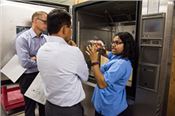|
Researchers, Rice Industries Exchange Information At Annual Meeting
FAYETTEVILLE, ARK.
A new initiative to share scientific knowledge with rice processing industries was announced during the annual Rice Processing Program Industry Alliance Meeting here.
Hosted by the University of Arkansas System Division of Agriculture in the nation’s No. 1 rice producing state, the meeting provides an arena for industry leaders and scientists to compare notes, research and resources. More than 100 industry representatives, rice growers, equipment suppliers and consultants attended this year’s meeting, May 24-25.
Ya-Jane Wang, professor of food science, and Rusty Bautista, grain quality engineer at RiceTec, Inc., announced the development of short courses offered by the Division of Agriculture’s department of food science.
The courses will be designed to transfer research-based knowledge about rice chemistry, quality and applications to industry employees and rice farmers. Development of the courses is sponsored by the American Association of Cereal Chemists International.
“The courses will offer knowledge to help improve rice production and processing,” Wang said. She added that the courses will be a two-way street, allowing the industry to provide feedback about how division research can help meet production and processing challenges.
Meeting participants were given a survey by which they could suggest priority needs the short courses could address.
Research and industry presentations during the meeting covered advances in rice production, storage and processing practices, as well as consumer studies.
“This is a signature event for our program,” said Terry Siebenmorgen, University Professor of food science and director of the University of Arkansas System Division of Agriculture’s Rice Processing Program. “Not only does the industry support us with funding and equipment, but they also provide us important end-user feedback.”
Siebenmorgen said the Rice Processing Program team investigates a wide range of topics from kernel development to consumer wants. The team’s expertise includes plant physiology, carbohydrate chemistry, process engineering, plant pathology and sensory analysis.
With alliance support, program scientists are tackling some of the biggest challenges in the rice industry. One of the best examples of this partnership, Siebenmorgen said, has been the discovery and understanding of the role nighttime air temperatures play in determining rice processing quality.
The entire Rice Processing Program team contributed to the many pieces of information that collectively identified high nighttime air temperatures as the culprit, Siebenmorgen said, and the Division of Agriculture’s relationship with rice processing companies was a valuable asset during their investigation. ∆

Ph.D. student Sangeeta Mukhopadhyay explains rice
drying research to Rob McLean of Bühler Inc. and Rusty Bautista
of RiceTec during a tour of Division of Agriculture rice processing labs.
Image by Fred Miller
|
|